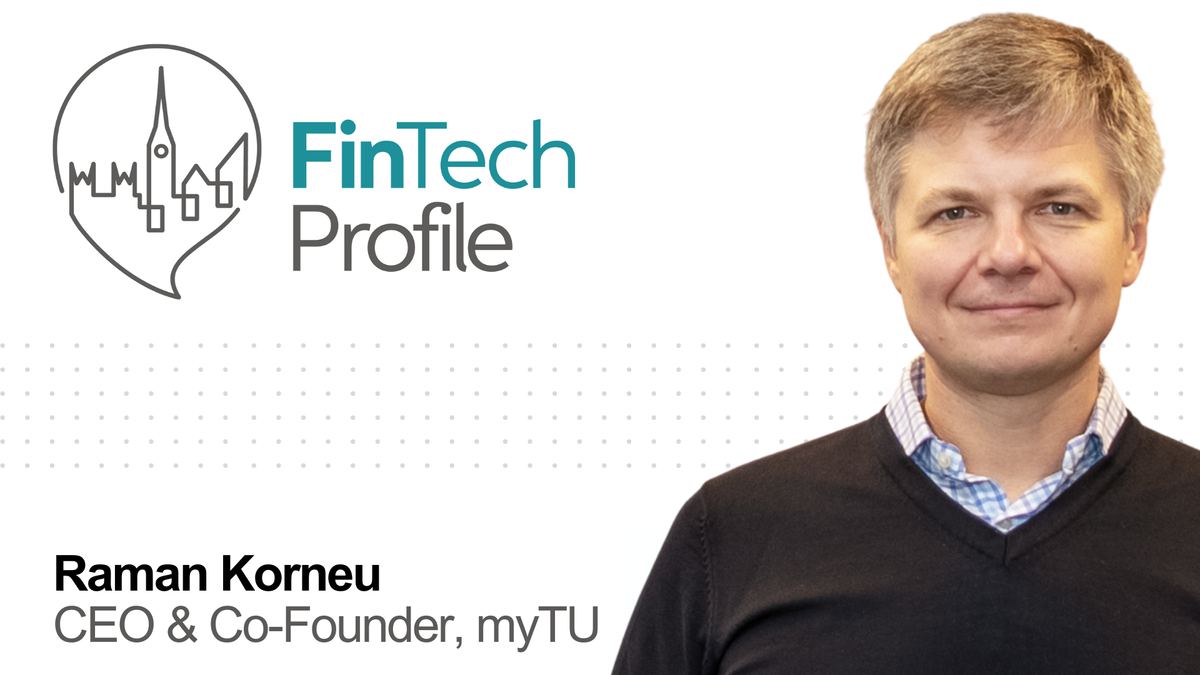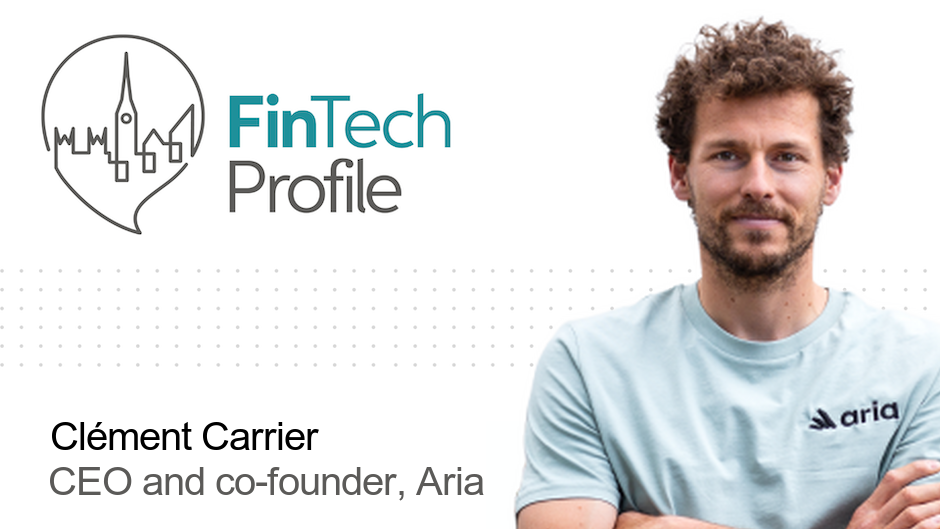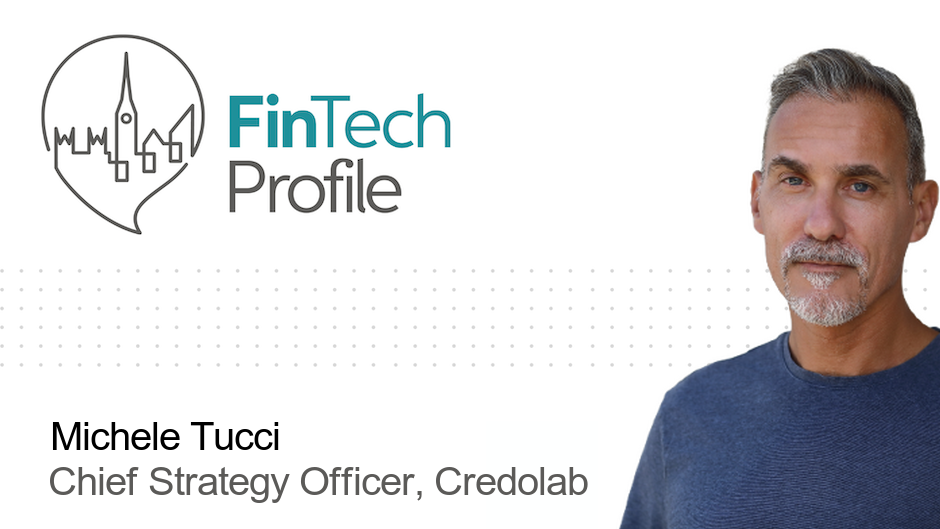Raman Korneu, CEO & Co-Founder, myTU

Today we're meeting Raman Korneu, CFA, CEO & Co-Founder of neobank myTU. They are pioneering the use of cloud-only infrastructure and AI to make essential financial services easier to access, more secure and more cost-effective.
Over to you Raman. My questions are in bold.
Who are you and what's your background?
I’m Raman Korneu, and I’m the CEO and Co-Founder of myTU. I’ve spent my career in the banking sector, and I like to think of myself as an industry veteran by now. I began my studies in Belarus, where I received my bachelor’s degree in international business. After undergrad, I worked as the Manager of Global Financial Services for Ernst & Young and then as Senior Manager of Banking and Capital Markets at PwC.
Following my time at PwC, I received my EMBA from Judge Business School at Cambridge and worked as Deputy CEO and CFO at Locko-Bank, which focuses on lending to SMEs. Recognizing the potential of fintech, I took on the role of CFO at IDFinance, an expanding international fintech company. In this role, I focused on emerging areas such as data science, credit non- FICO scoring, and digital finance, which marked my shift into the evolving world of financial technology.
By the time I co-founded myTU in 2019 I had a quarter century of experience in the banking industry and had worked on projects with heavy hitters like Raiffeisenbank and Intesa Sanpaolo Bank, so I knew exactly where the inefficiencies in banking were and what to do about fixing them.
What is your job title and what are your general responsibilities?
As CEO, every major decision comes across my desk, whether that’s about the product, marketing, or just general direction the company is heading. When there are major or minor changes to the financial landscape, I’m in charge of leading or strategising efforts to adjust to those changes.
Can you give us an overview of your business?
myTU is a fintech company that uses cloud-only infrastructure and AI to transform consumer and business banking. Our goal is nothing short of transforming banking services through technology that makes them more accessible, secure, and cost-effective. Our services are specifically designed to meet the needs of underserved markets and clients. When we were founded, that meant the travel industry and digital nomads, but we successfully pivoted to a broader market of individuals and businesses when the pandemic upended the travel sector.
Since our launch in 2019, we have developed a comprehensive banking platform accessible via a mobile app, web application, and APIs, providing a fully digital banking experience. This enables individuals and businesses throughout Europe to easily open and manage accounts, cards, payments, and soon, loans.
myTU stands out as one of the first entirely cloud-based neobanks, powered by an in-house core banking system that incorporates AI-driven KYC and AML solutions. Remarkably, the entire bank operates on less than €1,000 per month in infrastructure costs, utilizing the highly reliable Google Cloud Spanner distributed database. Our platform is designed for scalability, accommodating up to 10,000 new onboardings daily and capable of serving millions of clients.
Since obtaining our EMI license in 2020, we have experienced rapid growth, attracting over 50,000 customers from more than 100 countries, as well as over 200 legal entities. On average, we now welcome 1,500 new individual customers and 30 legal entities each month.
Tell us how you are funded?
myTU has secured a total of €9M in funding across three rounds. The most recent round, a Series A, is still ongoing and was initiated this year, with contributions from a mix of institutional investors, including corporates and family offices, as well as individual investors.
What’s the origin story? Why did you start the company? To solve what problems?
We started the company initially to service digital nomads and the travel industry. We saw the ways traditional banks weren’t catering to these groups, and we set out to change that. Later on, we realized that other groups of clients were also facing financial exclusion, leading us to expand our target clientele to include families and businesses that fall outside the traditional mold. Expanded financial inclusion in the digital economy is at the heart of our mission, and in practice that means achieving penetration in smaller countries and niche markets often overlooked by incumbent banks and the larger European neobanks.
For example, earlier this year myTU has launched the Payouts API to help consumer lending providers streamline their financial processes and improve efficiency. This API enables easy payment integration, allowing clients to quickly create payment orders, track payment progress, check account balances, and access account and transaction statements. Many such clients faced operational burdens with multiple bank accounts and outdated processes like web scraping. Transitioning to myTU's single API simplified their operations, reducing costs and improving scalability and security.
In the microloan sector, slow bank transfers impacted customer satisfaction. myTU enables funds to be disbursed in seconds, significantly enhancing the customer experience. Managing liquidity across various banks was also challenging, but consolidating with myTU improved forecasting and reduced costs. Our API automates transaction statement extraction, streamlining operations and increasing efficiency. Finally, myTU can handle up to 500,000 payouts per client daily, allowing seamless scalability as businesses grow.
Who are your target customers? What’s your revenue model?
Our target customers are these individuals and businesses in markets that are consistently overlooked by incumbent banks and larger neobanks, for example financial service providers. We want to provide them with the digital banking services that will make their lives and work more convenient.
Our business pricing structure is divided into four tiers, each tailored to meet the needs of businesses based on their size, complexity, and risk profile. For example, the entry-level plan is ideal for small, local businesses with simple ownership models, such as those in the retail or freelance industries. At the top tier, we offer specialized solutions for businesses in sectors like Electronic Money Institutions, Payment Institutions, Virtual Asset Service Providers, and more. This plan includes automated payment services and advanced support to help manage the regulatory and operational complexities unique to these industries.
If you had a magic wand, what one thing would you change in the banking and/or FinTech sector?
This year we’ve seen the vulnerabilities of the fintech ecosystem laid bare through shake-ups like the Synapse bankruptcy. The technological infrastructure isn’t flexible enough yet and regulation hasn’t modernised or individualised fast enough. There’s not enough differentiation in compliance settings and products, and that needs to change if fintech is going to continue growing at its current pace.
What is your message for the larger players in the Financial Services marketplace?
Embrace collaboration with fintechs like myTU. We bring innovation to the table, and together, we can drive value for customers in a rapidly evolving financial landscape shaped by open banking, embedded finance, decentralized technologies, and AI. Let's partner to lead the next wave of innovation.
Where do you get your Financial Services/FinTech industry news from?
I read Financial IT’s Weekly Investment Recap, The Fintech Times, and Marcel van Oost’s and Simon Taylor's excellent weekly analysis of the sector.
Can you list 3 people you rate from the FinTech and/or Financial Services sector that we should be following on LinkedIn, and why?
- Marcel van Oost publishes consistently excellent and detailed analysis of goings-on in the fintech world.
- Richard Branson is worth following for his adventurous spirit, innovative business strategies, and commitment to social and environmental issues, which inspire others to think outside the box and make a positive impact.
- Simon Taylor is an expert in banking, insurance, and FinTech, known for his popular Fintech Brainfood newsletter and his efforts to eliminate online scams while sharing his extensive industry knowledge.
What FinTech services (and/or apps) do you personally use?
I personally use a variety of services by opening accounts with all new emerging FinTechs to explore their features, onboarding processes, and offerings. So, I currently have over 50 accounts across different FinTech platforms.
What’s the best new FinTech product or service you’ve seen recently?
Klarna has found a great way to offer a helpful service while keeping things fun for customers. The pay-later option lets people enjoy a lifestyle they might not be able to afford right away, without any interest, inspired by popular figures like Snoop Dogg. All these elements create a strong brand identity that really fits with their slogan ‘Smoooth’. They have recently introduced a balance feature and cashback system, making the app even more appealing and improving the shopping experience.
Finally, let's talk predictions. What trends do you think are going to define the next few years in the FinTech sector?
There’s no downplaying the transformative role AI is having and will continue to have on the sector. It will shift employees towards more value-added roles, while machine learning will continue to improve data quality. Hyper-personalization is the future.
In the next few years, I believe the FinTech sector will be defined by several key trends, including the development of APIs that allow businesses to integrate financial services more seamlessly and manage their finances directly from their internal business management systems, an increase in diverse payment solutions to cater to varying customer needs, and the use of AI to enhance KYC and AML processes.
Additionally, we can expect significant improvements in customer support driven by AI technologies, making interactions faster and more efficient. These trends will not only improve operational efficiency but also enhance the overall customer experience in the financial services landscape.
Thank you very much for taking the time to participate Raman.
You can find out more about Raman Korneu, CFA on LinkedIn and read more about his company myTU at http://www.mytu.co.




